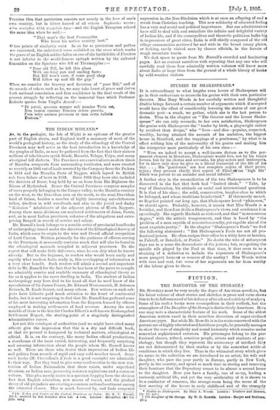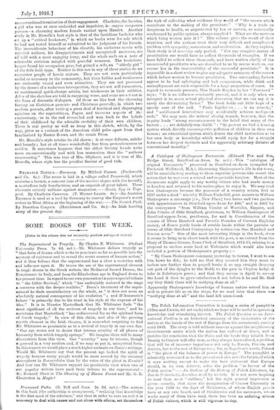FICTION.
THE DAUGHTER OF THE STORAGE.t
Mn. HOWELLS must be very nearly the doyen of American novelists, but his latest volume of short stories and sketches in prose and verse shows him to be in full command of his delicacy of touch and subtlety of an alysfa Some of his earlier books were cosmopolitan in their outlook, but tha atmosphere of The Daughter of the Storage is distinctively American. Hera one may note a characteristic feature of his work. Some of the ablest American writers excel in their merciless dissection of super-civilized American types. But while Mr. Howells is in the main concerned with the portraiture of highly educated and fastidious people, he generally manages to show the core of simplicity and sound humanity which remains under somewhat sophisticated exteriors. His personages belong to the pro- fessional classes, refined, sensitive people, artists and students of psy - ehology; but though they represent the aristocracy of intellect they are not dehumanized by their studies or by the somewhat artifie:al conditions in which they live. Thus in the whimsical story which gives its name to the collection we are introduced to an artist, his wife and daughter, who pass the year partly in Europe, partly in New York, partly in the country, and spend so much time in storing and removing their furniture that the Depository comes to be almost a second home to the daughter. Here you have a family, one of many, leading a curiously artificial life, and yet the very artificiality of it is shown to be a conductor of romance, the storage-room being the scene of the first meeting of the lovers in early childhood and of the strangely • Studies in Shakespeare. By Mary A. Woods. London: Trusiove and Hanson. [3s. lid. net.] t The Daughter of the Storage. By W. D. Howells. London . Harper and Brothers. L6s.1 Moen ventional termination of their engagement. Charlotte, the heroine, a girl who was at once undecided and impulsive, is—magno componere part am—a charming modem female variant upon Hamlet. Another study in Mr. Howells's best style is that of the fastidious bachelor who set up a "critical bookstore," in which no books were for sale which he had not tested himself or submitted to the judgment of his friends. The inconsiderate behaviour of his clientele, his embarras-ments with rejected authors, his disappointments and unexpected successes, are all told with a most engaging irony, and the whole ends on a note of admirable criticism mingled with graceful romance. The bookstore- keeper found his occupation gone, but gained a wife, an "elderly girl" of the belle laicle type. Neither in this nor in any of these stories do we encounter people of heroic stature. They are not even particularly useful or necessary to the community, but their foibles and weaknesses are eminently venial and even attractive. They are not possessed by the demon of a malarious introspection, they are not self-tormentors, or matrimonial quick-change artists, but wholesome in their oddities. A few of the sketches are told in easygo:ng verse, and sonic are set out in the form of dramatic dialogues. Of these we like best the charming fantasy on Christmas presents and Christmas generally, in which two modern parents, after venti ag a great deal of heretical anl disparaging opinions on the superstitioas, Pagan, and tiresome aspects of the anniversary, rre in the end reconcled and won back to the beliefs of thei: childhood by the adorable credulity of their own children. There is real poetry as well as irony in this sketch, which, by the way, gives us a rortrait of the American child poles apart from that familiarized by Buster Brown and the comic Press.
Mr. Howells's style retains its old charm : is at once delicate, subtle, and homely ; but at all times wonderfully free from pretentiousness or artifice. It sometimes happens that the oldest literary hands write more unconventionally and with less mannerism than the "authors commencing." This was true of Mrs. Oliphant, and it is true of Mr. Howells, whose style has the peculiar flavour of good talk.











































 Previous page
Previous page